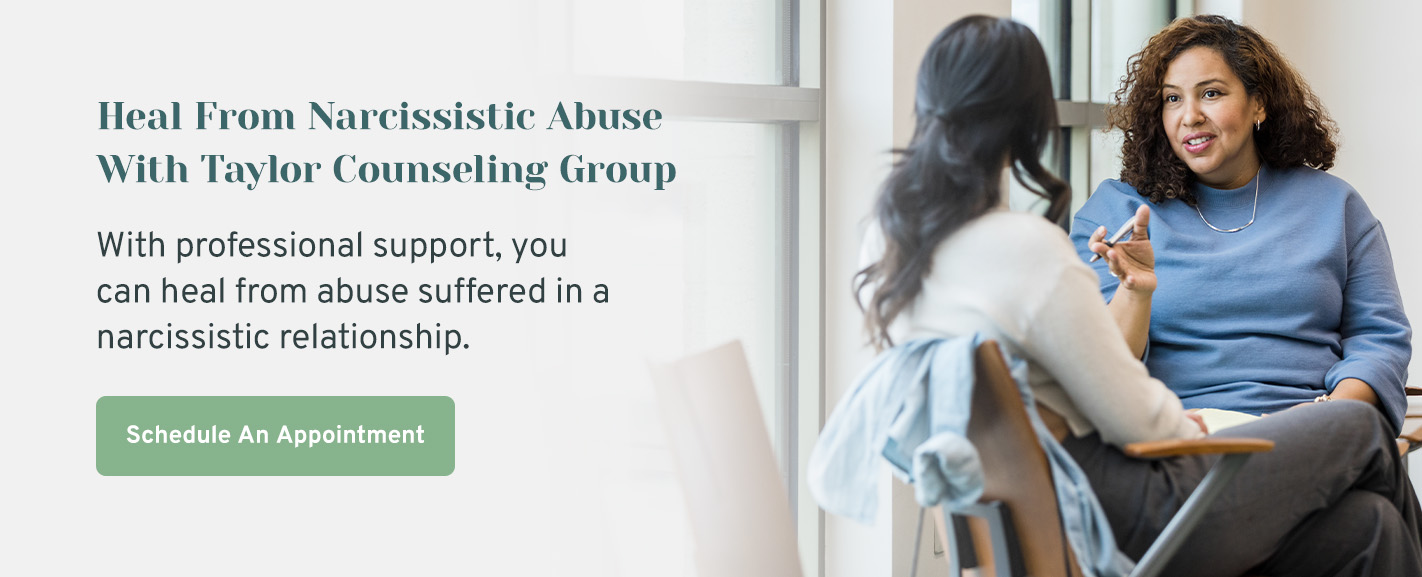Not every narcissist is charismatic and charming. When you talk to a covert narcissist, they may seem depressed, downtrodden and sorrowful at how the world has passed them by. However, the more time you spend with them, the more you’ll realize that some actually enjoy playing the victim. Others may not even realize what they’re doing, as their primary focus is getting their needs met.
The word “covert” means hidden, and this type of narcissism can take a while to spot, as it presents differently than overt narcissism. Most people choose to start relationships with covert narcissists because they feel bad for them and want to give them a supportive boost. If you’ve grown up in a family with a covert narcissist, you likely knew something was wrong but didn’t know how to explain it.
- What Is Covert Narcissism?
- Signs of Covert Narcissists
- How to Tell If You Know a Covert Narcissist
- How to Handle a Covert Narcissist
- Heal From Narcissistic Abuse With Taylor Counseling Group
Keep reading to learn more about covert narcissism — what it is, how to notice signs, and most importantly, the best way to respond to this kind of behavior.
What Is Covert Narcissism?
When you think of a narcissist, you likely think of an overt, classic, grandiose narcissist. These people are extremely self-obsessed and constantly seek attention. They don’t have empathy for others and often treat people like tools. Because some narcissists come off as extremely charming, it can take a while to see their true nature.
Covert narcissists have all the trademark qualities of a typical narcissist, including:
- Grandiose thinking
- Arrogance
- A lack of empathy
- A need for validation
- Manipulative tactics
- Inability to handle criticism
However, this type of narcissism presents very differently from the overt type. Covert narcissists are typically awkward in social situations and might initially come across as someone who just needs extra emotional support for their low self-esteem.
Signs of Covert Narcissists
There are a few ways you can easily tell you’re dealing with a covert narcissist. Here are a few of the behaviors that covert narcissists frequently use:
- Rage: Covert narcissists will be obviously angry and refuse to admit it. Instead of taking ownership of their own emotions, they will somehow put the blame on you for how they feel. Their anger and belief that the world owes them always simmers just below the surface.
- Passive-aggressive comments: Instead of being straightforward with you, covert narcissists will make passive-aggressive comments. For example, they might say, “You’re leaving me alone again? Oh well, I’m not important anyway…” instead of saying, “I’ve hardly seen you this week. Can we plan some time together soon?”
- Guilt: The number one way covert narcissists prolong unhealthy relationships is through guilt. They will guilt-trip and gaslight you until you become confused and stop trusting your own judgment. Because they can’t give you love, they will try to trap you with guilt.
- Isolation: Unlike other types of narcissists, covert narcissists dislike social events. They will shame you for wanting to spend time with others and pressure you to give them all your time. If you let them, they will completely isolate you from everyone else in your life.
- Victim mentality: Regardless of their poor behavior, covert narcissists will always blame things on other people. They are often jealous and critical of others because they feel the world owes them more than they’ve received. However, they’re unwilling to work toward actual change in their lives.
How to Tell If You Know a Covert Narcissist

After you spend time with a covert narcissist, you will be exhausted from trying to keep their emotional state balanced. However, it can be difficult at first to understand what is going on. Here are some specific signs of a covert narcissist so you can quickly determine what you’re dealing with:
- They give backhanded compliments. For example, they may say things like, “You’ve never been smart, but I’ve always liked you anyway.”
- They openly criticize you after you’ve achieved something. For example, they might say, “You certainly need a lot of attention. I hope you don’t let this go to your head. I know the real you, and you’re not that special.”
- They can’t take any criticism of themselves, even if it’s meant kindly. If you try to give them an action step to change something they’re unhappy about, they’ll react with blame-shifting and rage.
Covert narcissists act like leeches, sucking the life out of the people around them. But because they seem so unhappy, kind people will keep trying to help them and getting burned by them. After you’ve invested enough time into someone, it can be difficult to walk away from the relationship — especially if the covert narcissist’s abusive messages about your self-worth have started to sink in.
How to Handle a Covert Narcissist
Although they present differently, covert narcissists should be handled the same way as all narcissists. The first step is for you to accept the reality of what’s happening — that your loved one is a covert narcissist or at least has some narcissistic qualities. Next, you have to accept that you can’t change them.
Covert narcissists don’t take ownership of their own emotions and reactions. To find relief in these relationships, many people practice the following steps:
- They stop explaining how they feel. The covert narcissist doesn’t want to hear it, and they’ll continue twisting your explanation to serve their purposes. Instead, focus on them. Tell them their actions were wrong and refuse to let them make this about you.
- They practice grey walling. Narcissists thrive on reactions, so some people work on hiding their emotional and physical expressions during their interactions with a narcissist. The goal is to become so uninteresting that they’ll go look for another target.
- They go to therapy. If you’re living with a narcissist, it has impacted your self-esteem at some level — probably more than you think. Recovering your sense of self is essential to healing from an unhealthy relationship.
The only person you have control over is yourself — and healthy emotional boundaries start by recognizing that. Covert narcissists will make you feel like a bad person just for existing. Although your actions do affect others, you are not responsible for every emotion other people experience.
Heal From Narcissistic Abuse With Taylor Counseling Group
With professional support, you can heal from abuse suffered in a narcissistic relationship — or from recognizing you may have narcissistic tendencies yourself. You can take responsibility for your personal healing journey by going to counseling and gaining perspective on your experiences.
At Taylor Counseling Group, we offer a variety of specialized counseling services for individuals, couples, families and children over 5. We have several offices throughout Central Texas. Schedule an appointment with us through our online client portal today!

Related Articles & Resources:
- How to Deal With A Narcissistic Family Member
- 10 Ways To Set Boundaries With Difficult Family Members
- Signs of Gaslighting and How to Respond
- The Impact of a Narcissistic Sibling
- Why Do I Attract Toxic People?
- Narcissistic Triangulation: What It Is, How to Recognize It and Tips for Dealing With It
- Covert Narcissists: Signs and How to Respond to One
- Individual Counseling






